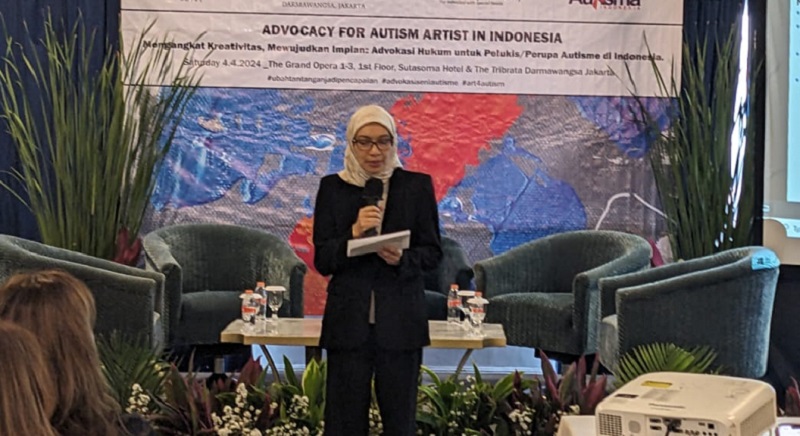THE INDONESIA Autism Foundation in cooperation with MATALESOGE HospitABLElity Academy and Sutasoma Hotels & The Tribrata Darmawangsa Jakarta held a talk show with the theme: ‘Raising Creativity, Making Dreams Come True: Legal Advocacy for Painters/Artists with Autism in Indonesia’ which was held on Saturday, (04/5), 2024 at the Grand Opera 1-3.
In the opening remarks of this event, Dr. Adriana S. Ginanjar, Msi, Psi, Chairman of Indonesia Autism Foundation said that this event was related to the commemoration of Autism Awareness Day, which fell on April 2, with the theme: “Raising Creativity, Making Dreams Come True,” which shows that people on the autism spectrum have been able to develop their potential well, contribute to society and have better social adaptive skills.
“We all know that currently there are many of them who produce quality works of art in the form of painting, music, dance and other fields. Therefore, copyright protection and understanding the law is very important so that works of art are protected from misuse by other parties without the permission of the creator.
Meanwhile, Wiku Anindito, Associate Partner at HHP Law Firm, said that advocacy is needed between the government and artists, especially those with special needs, regarding the legal language regarding copyright so that it is easier for artists to understand.
For example, Wiku continued, through Law No. 28 of 2014 on Copyright, the government hopes that Indonesian artists will no longer experience piracy. Copyright regulations must continue to be enforced to create a climate of honest and objective courage. But has it really been implemented properly? I don’t want to go too far.
He explained that creators or copyright holders have rights that must be protected by the government, namely in the form of economic rights and moral rights. The existence of economic rights and moral rights indirectly means that a person has his own values, so it is not easy for irresponsible parties to use their property rights for commercial interests.
“The function of copyright is only to protect artists in terms of their economic and moral rights, but at present there are still many artists, especially those with special needs, who only focus on their work and ignore copyright,” he noted.

Similarly, according to Shopia Aradhu, mother of Nindhita, autistic entrepreneur (creator of CuteMonster IP), said CuteMonster is a fashion product that was born from the cold hands of my daughter. She is the creator behind CuteMonster whose creations have now reached thousands of images. The uniqueness of CuteMonster itself can be seen in the characters created by Anindhita. CuteMonster is inspired by the shape of cute monsters.
“Her efforts never betray the results. Thanks to her talent and hobby of drawing since childhood, CuteMonster is here and has managed to make her proud, especially the people around her. CuteMonster products are also marketed through digital platforms. However, Anindhita dreams of taking CuteMonster products abroad, to various Asian countries. It could be Singapore or Malaysia, she said, because they are close to Indonesia,” said Sophia.
But, Shopia continued, she would be happier if CuteMonster could enter Japan, South Korea or China. That’s because they like animation, so good animation is made in Japan, Korea or China.
However, when asked if CuteMonster has received official copyright protection, Sophia answered that we have legally registered the copyright, but unfortunately there are still many of us here who don’t understand/know about copyright law. In fact, we often see people casually using CuteMonster’s work.
“So, copyright is an exclusive right that is automatically given to a creator for his or her works. Copyright is intellectual property in various fields. The function of copyright is to respect a work and encourage the creator of the work to produce new works,” she noted.
Likewise, Charmie Hamami, Deputy Chairman, Asia-Pacific Managing Director, Indonesia at CHRISTIE’S, said that local artists need to be aware and understand the importance of legal protection of works of art. This is absolutely necessary and requires a process of development. Apart from that, the public and artists need to be educated consistently.
“Especially Indonesian artists who want to compete internationally. Apart from that, considering the high value of painting in the classification of the auction body, I remind artists to maintain the quality of their paintings. Such as aesthetic, technical components, the concept of the name and reputation of the painter,” concluded Charmie.
She also explained that paintings are a type of artwork that can be used as an investment instrument, with one of the main advantages being that art as an asset does not rise or fall in value like the stock market, which could lead to fraud. So, we have to guarantee authenticity and genuineness. And here the active role of the artist is to provide a guarantee of authenticity and legal protection by registering and recording it.
Meanwhile, Safrie Effendi, MATALESOGE visual arts teacher, said that parents should understand their children first. The person who needs to know and understand the child first after the parents is the teacher. Before or while teaching, teachers need to get information about their students.
Especially for individuals with special needs. The first thing to pay attention to is to understand the child. It is necessary to realize that each child has its own special and unique personality that cannot be compared with other children.
“For me at MATALESOGE Visual Arts, I see the potential that exists in that child. We look at their characteristics, strengths and weaknesses, then we set priorities to develop their potential in the direction of their painting,” he affirmed. [traveltext.id]
















